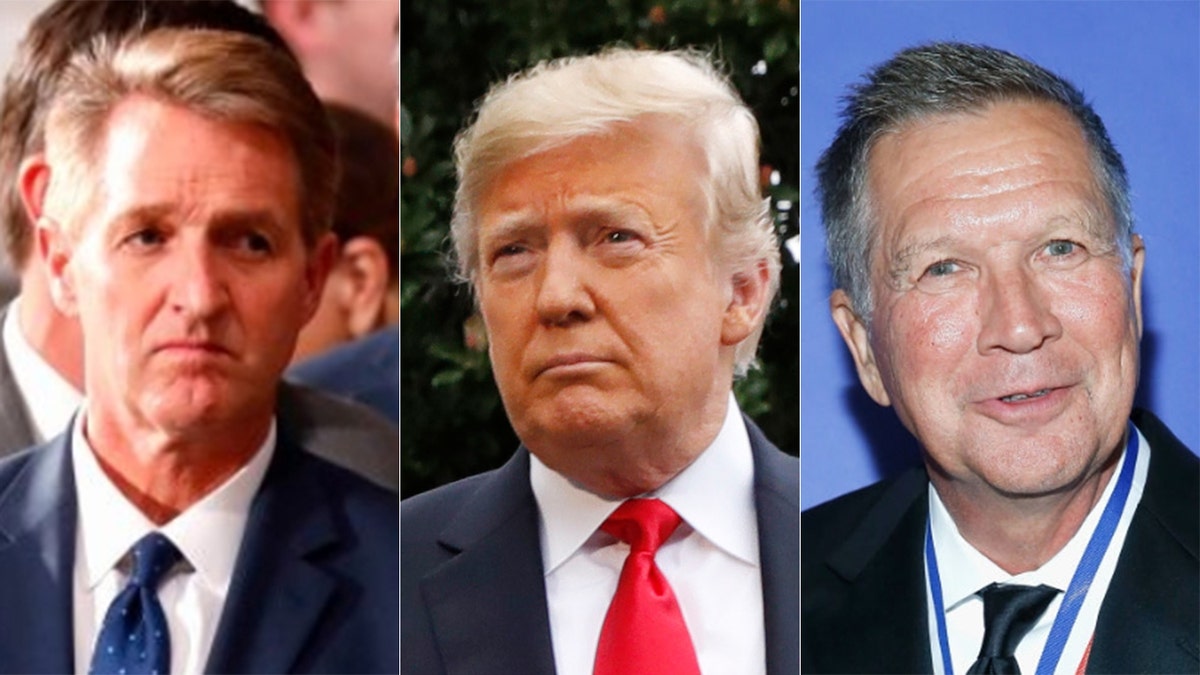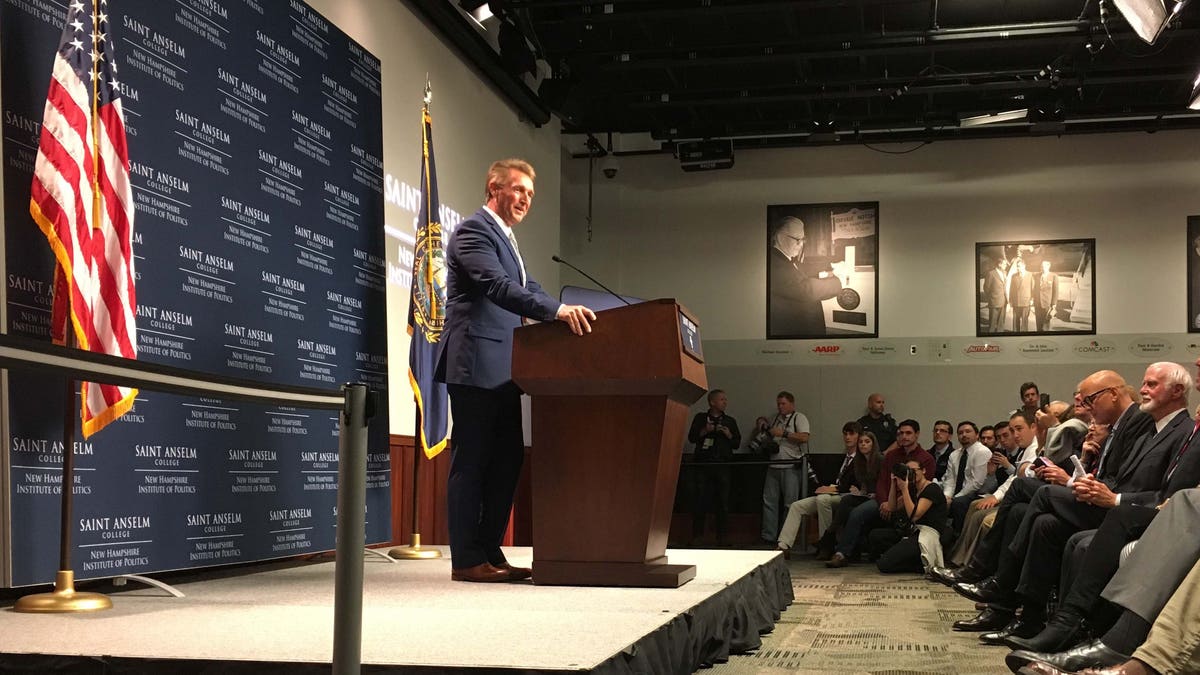
Jeff Flake, left, and John Kasich, right, have both made visits this year to New Hampshire, amid speculation about a possible Trump primary challenge. (Getty)
MANCHESTER, N.H. – Maybe it’s just coincidence, but John Kasich plans to return to the Granite State a week after November’s midterm elections – a period that indubitably will be declared the unofficial start of the 2020 presidential race.
The visit by the outgoing Republican governor of Ohio and vocal critic of President Trump will be his second this year to the state that traditionally holds the first presidential primary.
And it comes on the heels of another recent visit by another vocal Trump critic, GOP Arizona Sen. Jeff Flake.
The appearances already have fueled speculation about a possible rare primary challenge for a sitting president. That remains to be seen. But if – and it’s still a big if – the president faces serious competition from within the Republican Party, New Hampshire will likely be ground zero for the challenge.
“If a primary [challenge] comes, a credible one, it will happen here in New Hampshire. And it will do better than people expect,” longtime Granite State-based consultant Jim Merrill predicted.
“Not only does the size of the state make it easy to work in, the media market makes it easy to work in,” explained Merrill, a veteran of the 2004 President George W. Bush re-election campaign, former Massachusetts Gov. Mitt Romney’s 2008 and 2012 presidential campaigns, and Sen. Marco Rubio’s 2016 White House bid.
'If a primary comes, a credible one, it will happen here in New Hampshire.'
Kasich, who was runner-up to Trump in the 2016 GOP presidential primary in New Hampshire, told Fox News that “all my options are on the table” when asked about any 2020 intentions during his spring visit to the Granite State.
Flake, who decided to retire from the Senate at the end of this year rather than likely lose a primary challenge, downplayed talk of taking on Trump during his second visit to New Hampshire this year. The senator told reporters he was “not really thinking about that. There’s too much going on in Washington now.”
But he didn’t close the door entirely.
Asked by Fox News if he’d be returning to New Hampshire, he said, “We’ll see.”

Sen. Jeff Flake talks to New Hampshire voters, while downplaying the possibility of a Trump primary challenge, for now. (Paul Steinhauser)
There are reasons any potential inside challenger to Trump would look to New Hampshire first.
Merrill pointed to the state’s open-style primary that allows independents (40 percent of the state’s electorate) to vote in either Republican or Democratic contests.
“The president’s had his struggle with independent voters, so a Republican candidate looking to make inroads would do well to look at New Hampshire,” Merrill said.
David Carney, a Granite State-based GOP consultant who’s also a veteran of numerous presidential campaigns, agreed: “Clearly, if you’re going to challenge Trump, New Hampshire’s the state to do it.”
There’s also history.
Both Ronald Reagan – in his 1976 challenge against President Gerald Ford – and conservative commentator Pat Buchanan – who took on President George H.W. Bush in 1992 – gave the incumbents major scares in the GOP primary in New Hampshire.
Trump easily won the 2016 New Hampshire primary, launching him toward the Republican presidential nomination and eventually the White House. He finished nearly 20 points ahead of Kasich, who came in second. But Trump took down a divided opposition, thanks to a large field of candidates.
That most likely wouldn’t be the case in 2020. If Trump faces legitimate primary competition, it may just be the president and one or two challengers on the ballot.
“I do think by the virtue of it being a smaller field and there now being a record to run on or run against, a candidate could conceivably do better here than in 2016,” Merrill said.
But Trump won’t be the blank slate of 2016 – he now has a record in the White House, which right now can boast of significant economic gains in his first two years, despite the daily chaos that consumes Washington.
Al Baldasaro, an outspoken Republican state representative who was a top Granite State surrogate and adviser to Trump’s 2016 presidential campaign, described Flake and Kasich as “two fake Republicans. RINOs (Republicans in Name Only).”
“There’s no doubt in my mind. The silent majority are still there for Trump,” he said. “Look at the rallies. The thousands of people he’s still drawing.”
Michael Dennehy also is skeptical that any primary challenge against Trump could get off the ground.
The veteran New Hampshire GOP consultant who served as a lead adviser on presidential campaigns for John McCain and Rick Perry took to Twitter to argue that “Flake/Kasich can’t win running to the left of Trump. Buchanan/Reagan ran on conservative platforms.”
Steve Duprey, a longtime RNC member from New Hampshire and a former state GOP chair, said “it would be very difficult to mount a successful challenge to the president here.
“His base is very devoted,” he said.
Then there’s the message. Carney claimed that potential primary challengers have yet to find a doctrine that appeals to fellow Republicans.
“They’re fumbling around for a message. They don’t really have a coherent message,” he said.
Another roadblock still to mounting a competitive primary challenge is money. Duprey noted that “to mount an effective campaign would take substantial resources and a plausible case on how you would win. ... At this juncture, those are daunting hurdles.”
He said it’s still too soon to say if an effective primary challenge could be launched. The results of the upcoming midterms and a shift in public opinion could alter the current equation.
“I think it’s too early to tell. The mood of the country can change very dramatically,” Duprey said. “But right now the economy is strong, the tax cut has taken effect and people appreciate that. And I think those two things make it even more difficult to challenge an incumbent president.”





















